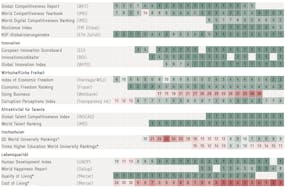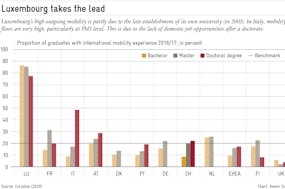The duty to serve is going through a crisis. The army is experiencing a chronic lack of personnel in the field and sees motivation decline among its troops. Recruits are increasingly “escaping” to join the civil service and it has become difficult to fill executive positions. The younger generations are stigmatized with moral indigence and civil service is compared to a military threat, yet the “analysts” of the Security Policy Committee of the National Council cannot seem to find a lucid diagnosis for the ills plaguing the duty to serve today.
Beyond the duty to serve, it is the entire Swiss militia system that is going through a crisis: a system that was once a symbol of our country’s success for decades. The citizens’ commitment as volunteers decreases and with it the culture of militia in many areas of civil life: fire brigades, local politics, various associations, etc. Switzerland risks losing one of the essential features of its political mastermind and gradually see its militia army disappear. Therefore, should we reconsider our model? If so, how should we rebuild it?
The army, a stronghold of the militia system
The compulsory military service is undoubtedly the Swiss institution where the spirit of militia is most perceptible. According to Article 58 of the Constitution, the army is organized according to the principle of militia; a rule in the organization of public life by which every citizen is required to take on public duties to serve the community, extra-professionally or on a voluntary basis.
This “Swiss notion of a state” believes in the active participation of its citizens in public affairs and expects them to have an acute sense of responsibility and commitment towards the common good (active citizenship). This leads to a strong promiscuity between the state and its citizens, giving them direct control of public affairs. The force of the militia system, which relies on the citizens’ active cooperation at all levels of society, is to ensure the smooth running of direct democracy.
The duty to serve is an important part of the militia system and the Swiss electorate has repeatedly reiterated its commitment at the polls; despite this, the facts show that the commitment of militiamen declines. In this article we try to draw a credible diagnosis of the ills in the duty to serve today; a bipartite diagnosis:
The decline of the militia system
In 1997, one in two Swiss citizens, above the age of 15, had an extra-professional activity; today this figure is down to one in three. Modern life, characterized by an individualistic lifestyle, the erosion of traditional social bonds and increased work pressure, gradually tends to break down the militia system. As a matter of fact, this collective organizational model requires from citizens, a certain economic and time availability, and thus depends on their willingness and ability to participate. However, citizens’ time availability drops as the work load grows, as women enter the labor market and as our country’s share of foreign residents who are less likely to engage in the militia system increases.
A hypocritical operation
In the past 25 years, many reforms have had an impact on the army as well as the duty to serve. Following the restructuring of geopolitical equilibriums on the continent and the relating decline in defense efforts, the army has cut down its workforce considerably. In the 1990s, the army consisted of 800,000 men, then the regulatory troops progressively decreased to 400,000 men under the model Army 95, and subsequently to 200,000 men under the reformed model Army XXI, and 140,000 men today with the DEVA (development of the army project). The drop in the troops was also a result of reducing the age limit for the duty to serve to 34, decreasing the number of days of service to 260 days, lowering the fit to serve scale to approximately 65% and by creating a more permissive transition to the alternative civilian service. These reforms reached their objectives but not without prejudicing the institution of the duty to serve along the way.

Compulsory military service is undoubtedly the Swiss institution where the spirit of militia is the most noticeable. (Photo: VBS / DDPS)
The duty to serve only applies to 40% of the resident population in Switzerland – men of Swiss nationality. In 2016, at the time of recruitment, and with a fit to serve scale of 66.3%, only one in four young men was selected to complete their military service. This discrimination based on gender can no longer be justified in today’s society, the traditional division of roles has become obsolete. When the exemption from the duty to serve is considered to be the rule and serving an exception, the minority called to serve, experiences, in civilian life, a distortion in the competition on the labor market, to the benefit of the majority that are not serving (women, foreigners with permanent residents and Swiss men declared unfit for service). According to a pending motion at the Council of States, militaries admitted that the civil service could be penalized according to the number of days of service already performed. This would only increase the unequal treatment of those who may need to perform up to 455 days of service and the vast majority of their fellow citizens who do not perform a single one.
Using a fit to serve rate as an adjustment variable for the troops, distorts the notion of aptitude and compromises the principle of equity. Observing an arbitrary and unfair recruitment method, many young people liable for military service seek to evade their obligations by simulating poor health. Ironically, the army has a positive attitude towards individuals whose health seems to be deteriorating when close to recruitment, as it can’t include all the individuals in age to serve anyway.
Access to the civil service is based on the principle of a conscientious objection, generally misrepresented today. To be admitted to the civil service, candidates must declare a conflict of conscience – a euphemism for conscientious objection – substantiated by proof. There were about 600 cases of conscientious objection in 1990, whereas in 2016, 6,000 people were admitted to the civil service. Evidently, motivations other than conscientious objection are now taken into consideration. These reasons are not officially acknowledged, the military conceal their real motives and the case is closed.
Lastly, this model blocks access to the civil service to Swiss women volunteers. Indeed, the civil service is only available to individuals declared fit for military service. However, women only have access to military service on a voluntary basis. To be admitted to the civil service, a woman must first volunteer for military service before declaring that she cannot reconcile military service with her conscience … which is contradictory. As a result, women do not have access to the civil service, even on a voluntary basis.
The status quo is not sustainable: how to break the deadlock?
The status quo is synonymous of a deterioration of the crisis of the duty to serve. At the level of society, if nothing is done, the decline of the militia system will prevail and continue to impede the exercise of militia activity. At the level of the regime’s duty to serve, maintaining a hypocritical system will completely discredit the institution. The combination of these two factors will force us, sooner or later, to question the model of a militia army.
We must therefore consider a new model that takes into account social developments. What should this counter-model consist of? Essentially, what kind of society do we want?
Avenir Suisse’s suggestion for the establishment of a universal citizen service
Assuming that the militia system is the collective organization principle which is most appropriate for Switzerland and noting its constant decline in today’s society, Avenir Suisse suggests considering the possibility of a universal citizen service, which would replace the current duty to serve. This citizen service would be characterized as follows:
- replacing the military duty to serve with a universal citizen service
- expansion of services: military service (only for Swiss citizens), civil protection service, community service, overseas operations
- inclusion of all Swiss citizens, men and women, as well as foreign permanent residents
- length: 200 to 260 days depending on the type of service
- age: from ages 20 to 45 or 20 to 70 for example
Such a service would have the advantage of giving new life to the spirit of militia while taking into account the changes in society. In addition, it would address the problems related to the number military personnel which the Swiss army is facing in the field, by considerably extending the recruitment pool and allowing the Army to select the best candidates.
Together with the Military Society of Geneva, Avenir Suisse organized a debate on September 27 on the theme: “Duty to serve and the militia system: should we reconsider the Swiss model?. For more information, click this link.
This article appeared in the September edition of the magazine "Le Nouveau Genève" and the "Revue Militaire Suisse".





